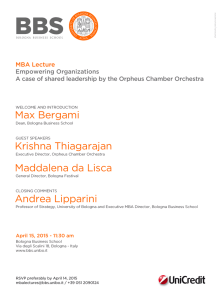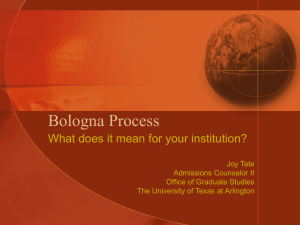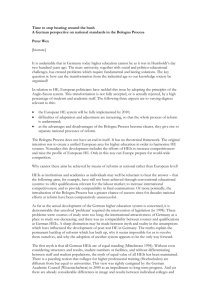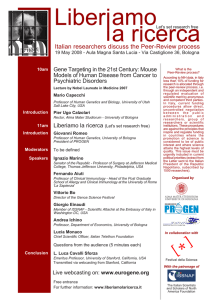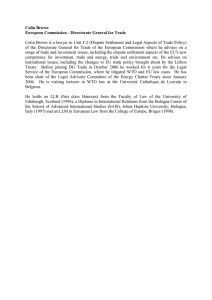Dipl-Ing Rest in Peace? - TeachING
advertisement
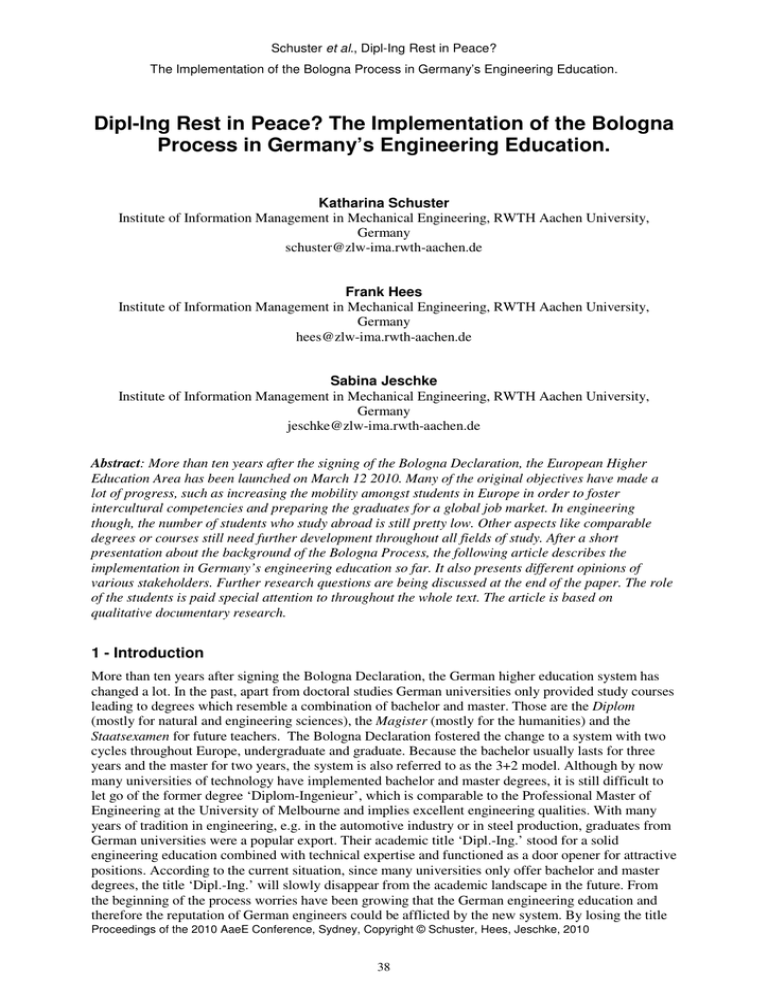
Schuster et al., Dipl-Ing Rest in Peace? The Implementation of the Bologna Process in Germany’s Engineering Education. Dipl-Ing Rest in Peace? The Implementation of the Bologna Process in Germany’s Engineering Education. Katharina Schuster Institute of Information Management in Mechanical Engineering, RWTH Aachen University, Germany schuster@zlw-ima.rwth-aachen.de Frank Hees Institute of Information Management in Mechanical Engineering, RWTH Aachen University, Germany hees@zlw-ima.rwth-aachen.de Sabina Jeschke Institute of Information Management in Mechanical Engineering, RWTH Aachen University, Germany jeschke@zlw-ima.rwth-aachen.de Abstract: More than ten years after the signing of the Bologna Declaration, the European Higher Education Area has been launched on March 12 2010. Many of the original objectives have made a lot of progress, such as increasing the mobility amongst students in Europe in order to foster intercultural competencies and preparing the graduates for a global job market. In engineering though, the number of students who study abroad is still pretty low. Other aspects like comparable degrees or courses still need further development throughout all fields of study. After a short presentation about the background of the Bologna Process, the following article describes the implementation in Germany’s engineering education so far. It also presents different opinions of various stakeholders. Further research questions are being discussed at the end of the paper. The role of the students is paid special attention to throughout the whole text. The article is based on qualitative documentary research. 1 - Introduction More than ten years after signing the Bologna Declaration, the German higher education system has changed a lot. In the past, apart from doctoral studies German universities only provided study courses leading to degrees which resemble a combination of bachelor and master. Those are the Diplom (mostly for natural and engineering sciences), the Magister (mostly for the humanities) and the Staatsexamen for future teachers. The Bologna Declaration fostered the change to a system with two cycles throughout Europe, undergraduate and graduate. Because the bachelor usually lasts for three years and the master for two years, the system is also referred to as the 3+2 model. Although by now many universities of technology have implemented bachelor and master degrees, it is still difficult to let go of the former degree ‘Diplom-Ingenieur’, which is comparable to the Professional Master of Engineering at the University of Melbourne and implies excellent engineering qualities. With many years of tradition in engineering, e.g. in the automotive industry or in steel production, graduates from German universities were a popular export. Their academic title ‘Dipl.-Ing.’ stood for a solid engineering education combined with technical expertise and functioned as a door opener for attractive positions. According to the current situation, since many universities only offer bachelor and master degrees, the title ‘Dipl.-Ing.’ will slowly disappear from the academic landscape in the future. From the beginning of the process worries have been growing that the German engineering education and therefore the reputation of German engineers could be afflicted by the new system. By losing the title Proceedings of the 2010 AaeE Conference, Sydney, Copyright © Schuster, Hees, Jeschke, 2010 38 Schuster et al., Dipl-Ing Rest in Peace? The Implementation of the Bologna Process in Germany’s Engineering Education. ‘Dipl.-Ing’, German engineers risk to lose their seal of quality, their uniqueness and their distinguishing characteristics. Even though the discourse about the title ‘Dipl.-Ing.’ is only a small part of the whole implementation of the Bologna Process, it symbolizes the problems which accompanied the reform in German engineering education. Especially in the light of Australian Universities changing the current system from a traditional 4 year engineering bachelor degree to a 3+2 model, the following review of Germany’s implementation of the european higher education reform will be of interest also for the Australian audience. 2 - Illness or cure for Europe’s higher education? The Bologna Declaration In 1999, 29 European countries signed the Bologna Declaration. This act can be considered the beginning of the biggest higher education reform Europe had ever seen. With the goal to establish a European Higher Education Area the countries committed themselves to follow-up complementary higher education reforms in order to achieve academic compatibility between the different nations. The main objectives written down in the declaration are 1. Adoption of a system of easily readable and comparable degrees 2. Promotion of European citizens employability 3. Adoption of a system based on two cycles, undergraduate and graduate 4. Establishment of a system of credits, also for the 5. Promotion of mobility 6. Promotion of European co-operation in quality assurance 7. Promotion of European dimensions in higher education (European Ministers of Higher Education 1999) The debates in Bologna were accompanied by the founding of the Bologna Follow-up Group (BFUG) in order to evaluate and push the follow-up work of the Bologna Declaration. Signatory countries were supposed to start legislative reforms or governmental action within the higher education systems. Individual universities, higher education committees and related associations were due to analyze and discuss the consequences in their respective countries, although the independence, the autonomy and the individuality of universities were always to be preserved. The ministers of the 29 European countries explicitly set themselves a deadline: The European space for higher education should be completed in 2010. Since 1999 the ministers of higher education have met every two years in order to move on with the implementation. Today the Process has 47 members who launched the European Higher Education Area on 12 March 2010 by signing the BudapestVienna Declaration. Under point 6, the declaration says: “Recent protests in some countries (…) have reminded us that some of the Bologna aims and reforms have not been properly implemented and explained. We acknowledge and will listen to the critical voices raised among staff and students. We note that adjustments and further work, involving staff and students, are necessary at European, national, and especially institutional levels to achieve the European Higher Education Area as we envisage it.“ (European Ministers of Higher education 2010). This statement alludes to the fact, that the implementation of the process was accompanied by problems. At least in Germany, different voices demanded a reform of the reform (Fries 2010, Dreisbach 2010, TU9 2010). 3 - Implementation in Germany’s engineering education The German Bologna Group consists of different governmental and non-governmental representatives, with the German rectors’ conference probably being one of the most cited. Another influential group is the conference of the ministers of higher education of the German federal states, the Kultusministerkonferenz (KMK). This group is the most powerful legislative body on a national level because regarding to the German federal system, all higher education issues fall into jurisdiction of the federal Proceedings of the 2010 AaeE Conference, Sydney, Copyright © Schuster, Hees, Jeschke, 2010 39 Schuster et al., Dipl-Ing Rest in Peace? The Implementation of the Bologna Process in Germany’s Engineering Education. states. The fact that due to the federal system it was not possible to develop one national Bologna strategy surely was one of the main reasons that the reform was progressing slowly. The only way to have a national impact on higher education issues is the Hochschulrahmengesetz (HRG, Framework law on universities and colleges). According to the amendment of the HRG in 1998, German higher education institutions already then had the possibility to award degrees which were comparable to bachelor or master degrees. The number of years which had to be studied for a bachelor degree was at least 3, but no more than 4. The study time for a master degree had to be at least one year but no more than two years long. Alesi et al. (2005) found that ‘on half-time’ of the reform there was no consistent logic of the systems of two cycles. The model of 3+2 years was in fact the basic structure, but still several variations of that model existed. In 2003 the Kultusministerkonferenz in Germany enacted that all bachelor and master degree programs had to be accredited and all bachelor degree programs had to last between 6 and 8 semesters (Kultusministerkonferenz 2003). The decision of the duration of a bachelor study program shows, that in this case the national framework of the HRG was also accepted by the representatives of the federal states. The subjects of engineering and economics were considered as precursors regarding the implementation of a new system which provides two academic degrees which both qualify the graduates for a professional life, the bachelor and the master (Alesi et al. 2005). Nevertheless, during the implementation of the new system the loss of the generally accepted degree of the DiplomIngenieur had been an issue all the time. This ambivalence with the quick implementation of new degree programs on the one hand and the commitment to the old degree on the other hand has been typical for the implementation of the Bologna Process in Germany. A possible solution is that universities would be allowed to award two titles for a master degree program – the master of science and the Diplom-Ingenieur. The TU 9, a network of the leading Institutes of Technology in Germany, demands this right from the federal states – however it is not that easy to implement juridically. Similar circumstances were only found in subjects like medicine, law or teaching degrees. But since these subjects were more or less excluded from the reform in the first place, like in many other countries as well, such as Norway, Austria or Hungary (Alesi et al. 2005), the situation was not as ambivalent as in engineering. Many of the university staff in engineering had problems with or arguments against the shift towards a bachelor-master-system. Alesi et al. (2005) showed that university rectors and employers in general had a more optimistic estimation of the higher education reform than students and staff. Being half way there, the general mood was considered as carefuloptimistic. By now TU9 switched almost all degree programs to the 3+2 model. A possible key figure in order to measure how students cope with the new system is the drop out rate. A new study from the Higher Education Information System (HIS) analyzed the drop out rates of different subject groups and the related motifs at 54 universities in Germany. Of all the students who enrolled in engineering sciences between 1999 and 2001, 25% left university without a degree. Since the measurement started with the enrollers of 1992, this number has stayed on a relatively high level, same as for mathematics and linguistics, cultural sciences and sport sciences (see figure 1). What we can also observe is that for subjects like law, economics and social sciences or in agricultural science, forestry and nutrition sciences, the drop out rate has decreased throughout the years. Beside the results listed in figure 1 the study also revealed that in Mechanical Engineering the drop-out rate of all enrollers between 1999 and 2001 was 34% and in Electrical Engineering 33% (Heublein 2010). Especially in the context of the global lack of competent professional engineers, this number seems alarming. Proceedings of the 2010 AaeE Conference, Sydney, Copyright © Schuster, Hees, Jeschke, 2010 40 Schuster et al., Dipl-Ing Rest in Peace? The Implementation of the Bologna Process in Germany’s Engineering Education. Figure 1: Development of drop-out rates at universities, subject groups (Heublein et al. 2010) If we look at the reasons why engineering students decide to quit, the study illustrates the changes of the motives throughout the years (see figure 2). Figure 2: Reasons for dropping out: Engineering students at universities (Heublein et al. 2010) Counting problems of pressure to perform and failure of exams together, almost 40% give excessive demands as the main reason for dropping out. By now only 8 % say that they quit because of financial reasons, whereas in 2000 almost one fourth of engineering drop outs claimed that as a reason. Failure in exams used to be the least given reason for dropping out, whereas now it’s at 14%. Heublein et al. see that as one indicator of the selective potential of the bachelor studies, where students have to deal with tough exams about the basics in mathematics and natural sciences at a relatively early stage, compared to the old diploma system. Moreover, every seventh drop out gives bad organization and a lack of practical reference as the reason. This could be another indicator for the problems of the implementation of the new system (Heublein et al. 2010). One major objective of the Bologna Process was to enhance mobility amongst students throughout Europe which is why it is worth looking at this aspect a little closer. Alone within the ERASMUS program, which was started by the European Commission already in 1987, over 2,2 million students Proceedings of the 2010 AaeE Conference, Sydney, Copyright © Schuster, Hees, Jeschke, 2010 41 Schuster et al., Dipl-Ing Rest in Peace? The Implementation of the Bologna Process in Germany’s Engineering Education. have spent a term in a different country in Europe until mid-2010. More than 4000 higher education programs in 33 countries participate in the program (European Commission 2010). ‘Doing ERASMUS’ has become a characteristic of a whole generation of students. However, a study of the Higher Education Information Center (Heublein 2009) shows that engineering students are the ones with the smallest interest to study in a foreign country. Only 16% of the engineering students in 2009 studied abroad, whereas in the humanities, medicine (33%) or languages and culture studies (37%) it is much more common. Heublein interprets the low mobility rate of engineering students as a result of the faculty culture in Germany’s engineering education which amongst other things also forms the mobility behaviour of the students. After financial problems the most reasons why students (not just in engineering) wouldn’t enforce studying abroad is a lack of support of the universities, difficult comparability with the demands of the study and time loss in the studies (Heublein 2009). Unfortunately the study didn’t show subject-specific reasons for going or not going abroad. 4 - The voices of the stakeholders There are still different voices about the way the Bologna Process was implemented in engineering faculties in Germany. Although he generally supports the Bologna Process and the reform, the Rector of the RWTH Aachen University Prof. Dr.-Ing. Ernst Schmachtenberg openly discussed the amenities of the Dipl.-Ing. in the media. He said that the German degree was a quality product and found it unacceptable to give up the symbolism and the radiance of that brand (Kaul 2010). The TU9, of which Schmachtenberg is also acting president, from the beginning stressed that the degree for a proper engineer should be the master - not the bachelor (TU9 2010). The Technische Universität Dresden explicitly holds on to the Diplom degree programs of electrical engineering, informatics and mechatronics because of its worldwide reputation. In Dresden it is not possible to get a bachelor degree in engineering, although some master programs are provided (TU Dresden 2010). The Association of German Engineers (Verein Deutscher Ingenieure, VDI) claims that the bachelor should be a degree which enables the graduate for master studies but also for employment - not a smaller top but a broader basis of engineers should be the goal (VDI 2010). The students also participate in the big discourse. Although not comparable to the student’s movement in 1968s, the Bologna Process has led to big demonstrations, like in march in Vienna during the conference of the European higher education ministers (Dreisbach 2010). Although they don’t want to joggle the original goals of the Bologna Process anymore, students question the acceptance of the bachelor in the industry, especially in small and medium-sized companies. They state that the bachelor doesn’t prepare for the working world, that it demands too much learning matter per time, that it doesn’t foster mobility and that there are too few offerings of soft skill trainings (Dreisbach 2010). But although it doesn’t appear in the media very often, students in Germany have been involved broadly in the implementation of the Bologna Process on an operative level. In the accreditation process students are represented in many bodies and take part in hearings. In internal evaluation processes of universities, the evaluation of lectures by students is a key element (KMK & Federal Ministry of Education and Research, BMBF 2007). Nevertheless, Bornefeld (2009) showed at the example of RWTH Aachen University that in mechanical engineering the returns of the students were quite low; student councils may not even have sent the feedback forms back which they had been sent. A wider approach was tried from the ministry of education in Baden-Württemberg, where students got the possibility to e-mail all their problems with the new system directly to the ministry of education (Fries 2010). Without judging which one of the processes was better or more successful, the latter obviously had a lower hurdle for students to get involved in the development of the reform because it did not include any obligations or require a great expenditure of time. Proceedings of the 2010 AaeE Conference, Sydney, Copyright © Schuster, Hees, Jeschke, 2010 42 Schuster et al., Dipl-Ing Rest in Peace? The Implementation of the Bologna Process in Germany’s Engineering Education. 5 - How to reanimate the implementation – further steps and research questions Since Heublein contended that the low mobility rate of engineering students results of the faculty culture in Germany’s engineering education, future studies need to focus on the one hand the reasons and motifs of German engineering students why the interest of studying abroad is so low – and how to overcome this phenomenon in order to foster mobility. Even if German engineering graduates want to stay on the German job market, the chances are pretty high that they will work in companies which act globally – therefore engineering graduates need intercultural skills. On the other hand institutions which are in charge of fostering the students’ mobility, like student advisory services or international offices, need to be analyzed to what extend they provide support and help for the students. Apart from data like the number of enrolments or drop out rates, further key figures which measure the achievement of the Bologna goals, such as the comparability of degrees, the acceptance of degrees etc., need to be collected in order to demonstrate the progress of the reform. Since most of drop-out students in engineering give excessive demands as the main reason for dropping out, the workload and the ‘studyability’ of degree programs in engineering needs to be investigated as well. In the future the potential of the students to contribute to a successful implementation of the Bologna Process can be made use of in a more effective way than before. Apart from accreditation (meta-perspective) and the evaluation of lectures (micro-perspective) there are plenty of more possibilities to involve the students and create an ‘Open Bologna’ for everyone who is affected by it. It will be important to involve more students in fields like curriculum improvement or quality assurance and also in a more appealing way than before in order to make use of their innovative potential. They shouldn’t just get the ability to share their problems but furthermore their ideas how to improve the implementation of the Bologna Process. In order to make a voluntary engagement in higher education development more attractive for students, they need incentives. Students have to be intrinsically motivated. This is why they need to know how their ideas are handled or if they will be implemented, but they also need some kind of extrinsical motivation like winning a price for the best idea. Since today’s students all grew up with digital media, the possibilities of web 2.0 to connect people and to work together on problems without geographical borders need to be exploited. Especially engineering students which can be considered as problem solvers and have great analytical skills might inherit the innovative potential that is needed in order boost further implementation of the Bologna goals. Furthermore, the future alumni of engineering bachelor and master degree programs should be interviewed in order to find out to what extent their studies helped them in their field of work. In the middle of 2010 the initiative ‘Bologna – Future of Learning’ from the Mercator Stiftung and the VolkswagenStiftung funded degree programs and competence centres for different subjects. In order to tackle the challenges the Bologna Process has set for engineering sciences in Germany, three large and wellknown German Universities of Technology (RWTH Aachen, Technical University Dortmund and the Ruhr-University Bochum) launched the Competence and Service Center for Teaching and Learning in Engineering Sciences TeachING-LearnING.EU (www.teaching-learning.eu). On the service side, the Center organizes communication processes between the different stakeholders of German engineering education; students as well as university staff, employers, political decision makers and associations like the VDI. The Open Bologna program focuses on the involvement of the students. Therefore idea competitions and workshops will be organized. Lecturers of engineering subjects have the opportunity to participate in trainings, where concepts like problem-based learning are presented and connected to technical content. To support the trial of new teaching and learning concepts, flexible funds provide lecturers with the capital needed. On the research side, TeachINGLearnING.EU focuses on the problem of lectures with big audiences (500+) and on the measurement of the achievement of the Bologna goals. Although mainly focussing on the situation in Germany, the Center seeks the professional dialogue with other international associations in the field of engineering education. Especially for countries, which have to deal with similar change processes in the field of higher education, it is indispensable to exchange ideas and learn from each other. Proceedings of the 2010 AaeE Conference, Sydney, Copyright © Schuster, Hees, Jeschke, 2010 43 Schuster et al., Dipl-Ing Rest in Peace? The Implementation of the Bologna Process in Germany’s Engineering Education. References Alesi, B. et al. (2005). Stand der Einführung von Bachelor- und Master-Studiengängen in Bologna-Prozess sowie in ausgewählten Ländern Europas im Vergleich zu Deutschland. Berlin: Bundesministerium für Bildung und Forschung (BMBF). Bornefeld, G. (2009). Qualitätsorientierte Entwicklung und Einführung von universitären Bachelor/Masterstudiengängen im Maschinenbau. Aachener Reihe Mensch und Technik, Band 61. Aachen: Verlag der Augustinus Buchhandlung. Dahlmann, Jeschke, Schroeder, Wilke (2007). Challenge Diversity: New Curricula in Natural Sciences, Computer Science and Engineering. Proceedings of the Frontiers In Education Conference - Global Engineering: Knowledge Without Borders, Opportunities Without Passports, 2007. FIE '07. 37th Annual , vol., no., pp. F1G-7-F1G-12, Milwaukee/Wisconsin/USA Dreisbach, S. (2010). ‚Auf schmaler Spur in die Sackgasse?’ Focus online. Accessed at http://www.focus.de/wissen/campus/tid-17517/10-jahre-bologna-reform-auf-schmaler-spur-in-diesackgasse_aid_488507.html on July 14 2010 Elsner, Jeschke, Natho, Pfeiffer, Schroeder (2007). Attractive Universities: New Curricula in Natural Sciences and Engineering. Proceedings of the IEEE International Summit Meeting the Growing Demand For Engineers and Their Educators 2010 - 2020, vol. 50 Papers, no., pp.1-7München/Germany European Commission (2010). ERASMUS for students – get a new perspective on Europe. Accessed at http://ec.europa.eu/education/erasmus/doc1051_en.htm on 14 July 2010 European Ministers of Education (1999). The Bologna Declaration on the European space for higher education, Bologna European Ministers of Higher education (2010). The Budapest-Vienna Declaration of 12 March 2010. Accessed at http://www.ond.vlaanderen.be/hogeronderwijs/bologna/2010_conference/documents/BudapestVienna_Declaration.pdf on 14 July 2010 Fries, M. (2010). ‚Elektronischer Kummerkasten: Klick den Bologna-Button!’ Zeit Online. Accessed at http://www.zeit.de/studium/uni-leben/2010-01/bachelor-kummerkasten-2 on 16 July 2010 Heublein, U. (2009). Internationale Mobilität im Studium 2009. Wiederholungsuntersuchung zu studienbezogenen Aufenthalten deutscher Studierender in anderen Ländern. Hannover: Higher Education Information System (HIS) Heublein, U. et al. (2010). Ursachen des Studienabbruchs in Bachelor- und in herkömmlichen Studiengängen.Ergebnisse einer bundesweiten Befragung von Exmatrikulierten des Studienjahes 2007/08. Hannover: Higher Education Information System (HIS) Kaul, M. (2010): ‚Wir wollen unseren alten Dipl.-Ing. wieder haben’. Spiegel online Unispiegel. Accessed at http://www.spiegel.de/unispiegel/studium/0,1518,670764,00.html on 15 July 2010 Kultusministerkonferenz (2003). Ländergemeinsame Strukturvorgaben gemäß § 9 Abs. 2 HRG für die Akkreditierung von Bachelor- und Masterstudiengängen. Accessed at http://www.hrk.de/bologna/de/download/dateien/BS_080918__LaendergemeinsameStrukturvorgaben.pdf on 14 July 2010 Kultusministerkonferenz (KMK) and Federal Ministry of Education and Research (BMBF) (2007). Zweiter Bericht zur Realisierung der Ziele des Bologna Prozesses von KMK und BMBF. Bonn: Bundesministerium für Bildung und Forschung (BMBF) TeachING-LearnING.EU (2010): Website of TeachING-LearnING.EU. Accessed at http://www.teachinglearning.eu/ueber_uns/das_projekt.html on 14 July 2010 Proceedings of the 2010 AaeE Conference, Sydney, Copyright © Schuster, Hees, Jeschke, 2010 44 Schuster et al., Dipl-Ing Rest in Peace? The Implementation of the Bologna Process in Germany’s Engineering Education. Technische Universität Dresden (2010): Studiengänge, grundständig. Accessed at http://www.et.tudresden.de/etit/index.php?id=419 on 14 July 2010 The Association of German Engineers (Verein Deutscher Ingenieure, VDI) (2010). Inhaltliche Studienreform notwendig. Press release of 18 May 2010. Accessed at http://www.vdi.de/44033.0.html?&tx_ttnews[tt_news]=50028&cHash=05e0cdb9316faae41ca4a607ea6bae2d on 18 July 2010. Düsseldorf: VDI TU9 – German Institutes of Technology (2010). "Die Studienreform zur Erfolgsgeschichte machen Abschlussgrad "Diplom-Ingenieur" ist Bologna-kompatibel!". Accessed at http://www.tu9.de/presse/3516.php on 15 July 2010 Copyright © 2010 Schuster, Hees, Jeschke: The authors assign to AaeE and educational non-profit institutions a non-exclusive licence to use this document for personal use and in courses of instruction provided that the article is used in full and this copyright statement is reproduced. The authors also grant a non-exclusive licence to AaeE to publish this document in full on the World Wide Web (prime sites and mirrors) on CD-ROM or USB, and in printed form within the AaeE 2010 conference proceedings. Any other usage is prohibited without the express permission of the authors. Proceedings of the 2010 AaeE Conference, Sydney, Copyright © Schuster, Hees, Jeschke, 2010 45
